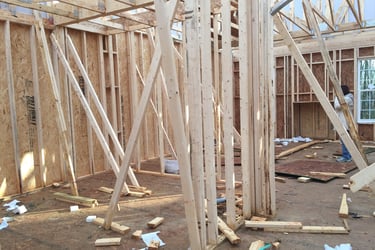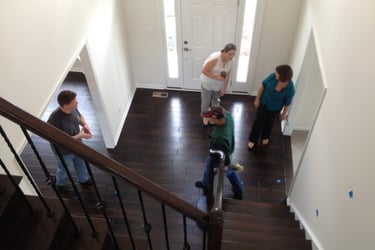
Buying New Construction Homes in Northern Virginia
Expert Guidance to Help You Navigate Builder Contracts, Save Thousands, and Avoid Costly Mistakes
Our careers in real estate began with representing a home builder, managing both brokerage operations and the sale of new communities in Fredericksburg, King George, Stafford, and Spotsylvania. During that time, Maryanne and I were surprised by how many buyers entered builder contracts without a real estate agent. Here’s what we discovered:
Many buyers thought they weren’t allowed to bring an agent to a new home purchase.
Others assumed skipping an agent would put them in a better position to negotiate a lower price.
Some believed builder transactions didn’t require professional representation.
First-time buyers often assumed they would have to pay the agent’s commission out-of-pocket.
What Actually Happens
While marketing and agent commissions are built into the home’s price, builders rarely reduce prices for unrepresented buyers. In fact, showing up to a model home without your agent can sometimes disqualify you from having one. Why? Because representation often leads to requests for contract changes—such as eliminating lot premiums, removing transfer taxes, or adding incentives—and builders aren’t eager to renegotiate on the buyer’s behalf.
Still, builders know it’s in their best interest to work with agents, especially since we represent qualified buyers actively comparing communities across the region.
Lower prices rarely happen in new construction, especially when inventory is tight. Instead, you’ll see offers like:
Half-price design upgrades
Free structural options (e.g., rec rooms, decks, morning rooms)
Closing cost assistance with use of the builder’s lender
But when do meaningful discounts occur? It all comes down to timing.
When to Negotiate on New Homes
1. When Builders Are Closing Out a Subdivision
At the end of a project, builders worry less about future appraisals and focus on clearing inventory. Marketing efforts are shifting to newer developments, and the last few homes—often on less desirable lots—can come with deep discounts. If you like the site, it’s time to negotiate.
2. When Contracts Fall Through
Builders aim for 19% profit margins. A canceled contract leaves them holding a completed home, which means insurance, interest, and loss. Watch for steep cuts: a $735,000 home in Potomac Shores dropped to $679,000, then again to $659,000 within a month after a contract fell through.
3. When Quarterly Sales Are Down
Publicly traded builders need to meet sales targets. If numbers are soft, they’ll host promotions like the “Welcome Home Sales Event,” offering $10,000 off or closing cost incentives. In these moments, we go beyond the promotion and negotiate for better terms on behalf of our clients.
4. Timing Matters
Negotiating power peaks in:
July and August (before back-to-school)
November through January (holiday/winter slowdown)
For example, in January 2015, we reduced a client’s contract from $664,000 to $611,000. If they had waited until February, when traffic picks up, that price would’ve been difficult. Likewise, in August 2015, we bought the best lot in a Stafford subdivision—waiving a $40,000 lot premium and securing 50% off design upgrades—by negotiating aggressively on August 31.
Why You Need an Agent
Builder Reputation
Experienced agents know which builders stand behind their products. We’ve helped clients through the entire process—from contract to warranty repair—and know which companies consistently deliver quality.
Experience Counts
The most important document in any builder contract is the standard features sheet. It details the materials, finishes, and systems included. Some builders omit this entirely from the contract. Don’t proceed without it—in Virginia, only written agreements are enforceable.
Verbal promises? They don’t count. We’ve seen builders make handshake deals that later disappeared. We won’t let that happen to you.
Critical Inspections
We ensure your contract includes scheduled inspections:
Site inspection and lot placement approval
Framing and structural walkthrough
Wiring and mechanical check before drywall
Final walkthrough inspections
These inspections confirm that everything—standard features and upgrades—is being built to spec. We’ll also advise you on change order deadlines, which many buyers miss without guidance.
As shown in our walkthrough photos, we’re not shy about using blue tape. If you’re not working with us, at least hire an inspector with construction knowledge. City or county inspections only check code compliance—not workmanship.
Financing Strategy
Builders often require you to pre-qualify with their preferred lender, which is legal. However, it’s illegal for builders to force you to use their lender exclusively. We’ve seen builder-affiliated lenders offer “free” upgrades, only to make up the cost through high rates or hidden fees.
That’s why we review your financing options and compare builder offerings with our trusted lender network—to find what truly benefits you.
Appraisal Challenges
Builder reps may try to influence appraisals by only showing sales within the subdivision. But if those comps don’t support the contract price, you’ll be expected to pay the difference out of pocket.
We’ve stepped in on behalf of clients to find independent comparable sales in surrounding communities—helping secure fair value and avoid financial strain at closing.
Closing Process
Before settlement, we review every financial document to ensure accuracy and transparency. We stay in close contact with the builder’s transaction coordinator and your lender to confirm that all deadlines, inspections, upgrades, and financial agreements are documented and finalized.
What It Costs to Build a Home
According to the National Association of Home Builders (NAHB) 2015 “Costs of Constructing a Home” report, the average $468,318 home on a half-acre lot breaks down as follows:
Interior finishes – 29.6%
Framing – 18%
Exterior finishes – 15%
Systems (HVAC, plumbing, etc.) – 13.1%
Foundation – 11.6%
Final steps (landscaping, cleanup, etc.) – 6.8%
Site work – 5.6%
Miscellaneous – 0.5%
Builders We've Worked With
We’ve helped clients successfully purchase new construction from:
Atlantic Builders, Augustine Homes, Beazer Homes, Brookfield Residential, Centex Homes, Del Webb, Drees Homes, D.R. Horton, Hazel Homes, Hylton Group, K. Hovnanian, Lennar, M/I Homes, NVHomes, Pulte Homes, Richmond American Homes, Ryan Homes, Ryland Homes, Sona Homes, Stanley Martin Homes, Toll Brothers, Tricord Homes, Van Metre, and Winchester Homes.
New Homes Real Estate Agent Maryanne Moyers
Associate Broker Maryanne Moyers Showing Richmond American Homes
A Successful Closing with Beazer Homes
Using Real Estate Agents When Buying New Homes
Problems with Building New Homes
Structural and Design Upgrades in New Homes
Maryanne Moyers discusses floor plans, structural and design options, and the difference in new home communities in Woodbridge, Virginia.
Maryanne Moyers working with a client and explaining the difference between production built homes, custom construction, and the building and contracting process with modular homes.
The conclusion of the new home buying process. A successful closing with Beazer Homes. We sold the existing homes of this couple and found a great house for them to enjoy together.
This is an example of poor execution during the construction process. The construction coordinator ignored the weather forecast resulting in completely soaked floors and standing water in the basement. An earlier start on framing would have allowed the construction of a roof with a protective layer shielding the building materials from the possibility of damage. The amount of building debris and trash indicates the subcontractors are not under direct supervision of representatives of the building company.
Builders pay commission fees for us to represent you. But it’s a good idea to have us with you during the home search tour in order to register us as your representative during the buying process.
Weichert Realtors Associate Broker Maryanne Moyers is shown here working with a client and Ryan Homes sales representative Cameron Walker signing a contract addendum after an agreement was finalized on interior upgrades.
The New Home Walk-Through Inspection
The Construction Meeting Before Building A New Home
Negotiating Pricing for New Homes
Finding Deals in New Home Communities
Maryanne Moyers helps clients during an initial walk-through of a newly constructed home. Dwayne and Maryanne attend all inspections and meetings with their clients. We are able to identify industry standards in workmanship. and unacceptable work and negotiate corrections before closing.
This is construction meeting between our client and representatives (construction coordinator and sales manager) of Ryan Homes at Lake Estates in Stafford County.
This picture illustrates the process of selecting structural upgrades and price negotiations between Maryanne Moyers (right) and Ryan Homes sales representative Lauren Keeler.
This is the Berkeley home design at Potomac Shores. When the buyer did not meet financing obligations, this home was discounted $66,000 and available for prospective buyers waiting for a bargain in this community. Contact us to watch this community and work with you when these opportunities arrive.
Main Phone
Email Address
540-446-6284
Connect
Explore
Site Map
About Us
Dwayne Moyers is a trusted real estate professional with extensive experience in buying and selling homes across Fredericksburg, Stafford, Spotsylvania, and surrounding areas. Proudly affiliated with Serhant., Dwayne combines local market knowledge with a commitment to delivering exceptional service tailored to your unique needs.
Contact Dwayne
Email: moyersteam@gmail.com
Phone: (540) 446-6284
Services
Address
1660 International Dr. Suite #600, Mclean Va, 22102






Resources




















